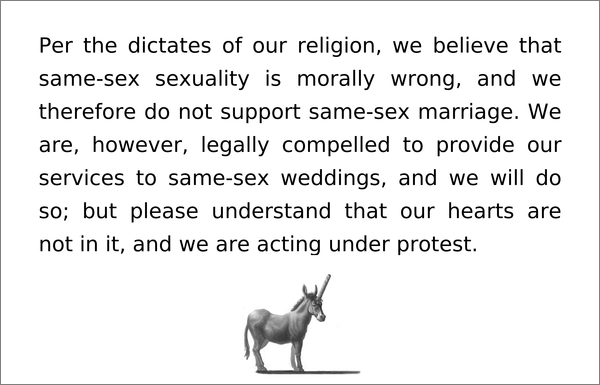Soft yet Steady Resistance
December 31, 2015
This essay is for those, such as myself, who see the world according to the Behavior View despite the crushing social pressure in favor of the Identity View. To understand these two opposing viewpoints on sexuality, I recommend you read my essays "The War Between Identity and Behavior", and "Identity Shells and How They Are Used Against You".
The Identity View sees the world clouded by identity shells. An identity shell is a false outer layer of identity placed around a behavior in order to hide that behavior and force its acceptance. Identity shells are designed to change the conversation from whether a behavior is right or wrong to whether a person should be accepted or rejected (with their behavior then forced to be implicitly accepted as well).
The most obvious example of an identity shell in society today is sexual identity. The same-sex movement claims that to oppose same-sex sexuality (the behavior) is to oppose "gay people" (the identity shell) because it claims that the people and the behavior cannot be separated, that the people are the behavior. What manipulative nonsense! Attraction is something that you feel, not something that you are, and behavior is always a choice.
But the Identity View is not only about same-sex sexuality. An identity shell could be crafted to force the acceptance of any behavior. We've seen this within our society already as social pressure has shifted from compelling the acceptance of sexual identity to compelling the acceptance of gender identity. And it will never stop shifting further, not until we learn to reject the Identity View and to accept the Behavior View, which is the idea that behavior is a choice, that some behaviors are wrong, and that those behaviors remain wrong even if there are people who wish they were right.
That is enough of a summary of these two moral viewpoints. For more details, I refer you to the previously mentioned essays. Again, this essay is directed at those who follow the Behavior View. It is my attempt to answer the question: What do we do now? Our society is wholeheartedly embracing and evangelizing the Identity View. So what do we do now? Same-sex marriage has been forcibly legalized by five judges who fancy themselves kings. There is no short term cause for us to champion right now. There is no election to campaign for. What now? What are we supposed to do?
My answer to that question can be found in the title to this essay: Soft yet Steady Resistance. This is a marathon, not a sprint, and the conflict is far from over. Yes, the foolish rulings of judges might have corrupted our society's definition of marriage, but remember that if a definition can be changed, then it can be changed back. Due to the mainly negative moral direction of our society these last few decades, it might seem that change only flows in a negative direction, but that need not always be the case. It's possible for society to move in a positive direction as well. Yes, those of us with an apocalyptic belief system might view the fall of society as ultimately inevitable, but it's beneficial to remind yourself that that fall doesn't have to happen now. We don't have to live our lives mourning a continual downward slope. It's possible for us to push things back up the hill, at least for a little while.
So that is what we should do: a constant stand in favor of what is correct. A stand that is soft, not brash. We must be patient with others as they are working through the confusion permeating our society. They will likely think poorly of us at times. They will likely treat us poorly as well. We must be patient for them to realize they are misjudging us, patient for them to realize they are misjudging the entire situation. And, most of all, we must be steady. Determination will be the winner in the end. We must have a constant determination to continue to stand despite social pressure to conform. It would be so much easier to give in, to close our eyes and join the misguided herd. But is that the type of life you want to live, to blindly follow the erratic dictates of the crowd? No, I don't think it is, because if it were, you would probably be living that way already. It would be easier after all.
If our culture continues in its current direction, you will become more and more of an outsider. When a co-worker chooses to be same-sex married, your workplace will erupt in excitement and celebration, just as they do over a normal marriage; but you will not share the sentiment. How could you? Your co-worker is legally committing themselves to a same-sex sexual relationship. For those who consider same-sex sexuality to be morally wrong, a same-sex wedding isn't a cause for celebration; it's a cause for regret, and for the hope that some day your co-worker will change their mind and choose to reject same-sex sexuality. And let's be clear—that would require them to reject the same-sex sexual relationship they are now legally committing themselves to. Yes, you will be an outsider. Learn to be comfortable in that role.
You can expect to be called a bigot. With a lack of logic on its side, the same-sex movement has no real weapon other than the hijacked emotions of the civil rights movement, and it will continue to wield that weapon so long as society permits it. The good news is there is an obvious defense. The word "bigot" carries expectations. It creates the impression that someone is a bad, mean, cruel person. So betray that expectation. This is about behavior, not people, right? It's about incorrect ideology and wrong actions, isn't it? Then show that truth through how you talk and how you act. Take the high ground. It's naturally yours, after all, isn't it? So take it. Be patient. Be kind. Be respectful. While we can never respect wrong behavior, we should always respect people. Remember, this has nothing to do with "gays" or "lesbians" or "homosexuals" or any other inaccurate, man-made label. This is about same-sex sexuality, a behavior that is morally wrong and that we therefore should reject in ourselves and discourage in others. Separate the behavior from the person in your mind, in your words, and in your actions.
But for some there is more at stake than being called a bigot. Some are being legally compelled to perform actions they believe show support for same-sex marriage, and which they therefore do not wish to do. This is the case for many who work in the wedding industry, whether photographers, bakers, or wedding planners. They sought this line of work because they wish to be part of weddings, but now, due to the change in our culture, they are being forced to take part in same-sex weddings, something they want nothing to do with.
How should they respond to this legal coercion? Should they say nothing and simply go along with the law, thereby risking they create the unhelpful impression that they support same-sex unions? Or should they take a line of hard resistance and thereby face direct and often draconian legal consequences? (Think of the Oregon baker couple who were fined $135,000 for not baking a same-sex wedding cake.) Ultimately it is up to each individual to decide how they will respond, but I propose a middle path, a path of soft resistance. Yes, you should comply with the law, but you should simultaneously make it clear you support neither same-sex sexuality nor same-sex unions and that you are acting under protest. How you do so is up to you, but here is an idea of a sign that could be displayed to clearly state your beliefs:
Yes, some will complain about a sign such as this, but given the legal situation, it is entirely appropriate. If you are being legally compelled to act in a way you believe contradicts your religious beliefs, then openly stating your opposition to those actions is certainly within your rights. Besides, we're talking about people who view same-sex sexuality as morally wrong and who therefore view all same-sex unions as impediments to an individual's progress. Why would a same-sex couple want a photographer to take pictures of their same-sex wedding if that photographer will be hoping the entire time that one day that same-sex couple will choose to split up? Let us be open with each other about how we feel about this topic. That way same-sex couples can choose to work with a business that is not morally opposed to the behavior they are legally committing themselves to.
And it's not just those in the wedding industry who should consider being more open about their opinion on this subject. Cultural change advances over the silence of those who oppose it. Can't you feel the aggressive advocacy in favor of the Identity View all around you? If you disagree with that advocacy, why not take a stand against the negative direction our society is being led? If all of us took that stand, perhaps we would be surprised at how many actually agree with us.
But let's be honest. The whole conflict over same-sex sexuality is wearisome. There's nothing special about same-sex sexuality. It's just a wrong behavior like any other wrong behavior, and it has received far more attention than it deserves. We don't want to deal with this. We don't want to even think about this. We just want to go about our lives and avoid confrontation. Yet, as we do nothing, cultural change creeps forward. If we disagree with that cultural creep and want it to stop, we need to make our disagreement known.
Does that mean we must constantly dwell on this topic? No. It doesn't need to be our focus, but our resistance must be steady. We should make it clear that we don't agree with the current moral direction of society and that we will never compromise our principles. How you do that is up to you, but here are some ideas of messages you could share: Soft yet Steady Resistance - Resource Page.
The underlying goal is to persuade others to agree that this is truly a matter of behavior, not of identity. As a defender of the Behavior View, you are a uniter, fighting against an ideology that seeks to divide. The Identity View tries to make this a case of us and them. The Behavior View declares it is about we, for we all are under the same moral obligations. Show that truth through your words and your actions. Show it through your soft yet steady resistance.



